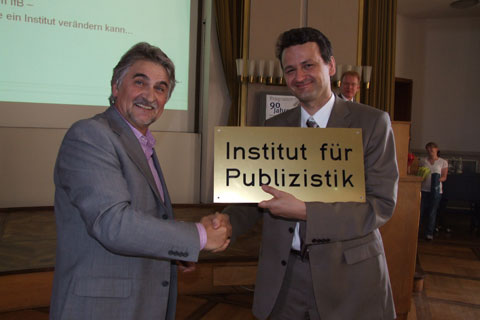

From Press Archive to Communication Studies – History of the IfK
Important foundations for an establishment of a communication studies department in Münster were laid during the first World War. In 1915, the historian Aloys Meister began creating a press archive. He also founded an interdisciplinary “Committee for the Newspaper Industry,” whose members regularly held lectures covering questions concerning the press. Only a few years later, 1919, the Committee for Newspaper affairs was founded. The journalist Friedrich Castelle was was in charge of its management. The first private lecturer for media affairs at the committee was Karl D’Ester. Unfortunately, the university had to end the program due to insufficient funding.
Financing through Newspaper Publishers
In 1927, the historian and director of the press office Günther Wohlers founded the independent “Department of Newspaper Affairs,” using funds from the North Rhine-Wesphalian Newspaper Publishing association. Two years later, the editor Heinrich Bause took over management of the department, which was renamed to “Department of News Publishing” in 1935. In 1936, the journalist Ernst H. Lehmann took over management but was succeeded only two years later by Hubert Max. In 1946, after course and research activity was halted due to the second World War, the historian and journalist Walter Hagemann came to Münster as professor and director of the Department of News Publishing.
Expansion of the subject under Hagemann
Another renaming in 1949 would take into account the new thematic contents that had found their way into the syllabus under Hagemann: The “Department of Journalism” would now cover all journalistic aspects and processes. Under Hagemann’s management and through his enthusiastic productivity the Münsteranian department gained prestige and reputation.
After Hagemann’s suspension in 1959, his assistant Günter Kieslich took over as acting director of the department. The Dutch sociologist Hendricus J. Prakke was appointed in 1960. Through the introduction to a functional research-perspective and the expansion of the subjects category to include all communication studies, the director Prakke proved very prolific.
Reactions to change: Renaming of the Department
His successor would first be acting director (1969), but in 1971 Winfried B. Lerg (a student of Prakke’s) was be named ordinarius and director. His term as director of the IfK is longest term that has served at the IfK and lasted 25 years. Siegfried Weischenberg was voted executive director in 1994. After a short term of being acting director, the political scientist Dietrich Thränhardt was succeeded by (each successor serving a complete term): Siegfried J. Schmidt (1997), Miriam Meckel (1999), Siegfried J. Schmidt again (2001), Bernd Blöbaum (2002), Christoph Neuberger (2007) and Frank Marcinkowski (2009). Since 2011 Ulrike Röttger is in charge of the Department’s management.
A final renaming in 1998 came as a result to adapt to the most recent developments of the subject – ever since the department goes by the name of ‘Department of Communication.’ Additionally, internal organization of the department was divided into the divisions Media science and Journalism.
90 Years Department of Communication Münster

The Munsteranian Department of Communication (IfK) celebrated its 90th birthday on July 2nd, 2009. Part of the program to celebrate this day included reports and updates to current research programs and a poster presentation, in which different research groups presented their work.
If PR-consultation in politics, TV-News and its’ reception, effects of personal conversations or the decline of printed news: the professors of the IfK discussed the relevance of research in communication studies and its importance in assessing current social developments.
Looking back, alumni of the the department discuss the history of the department: Emeritus Prof. Joachim Westerbarkey assessed the approaches in film studies at the department in Münster. Rof. Siegfried Weischenberg, who was active in Münster until 2000 and now researches at the University of Hamburg, pointedly took position in current as well as past theoretical debates of the IfK.
The festive activities took place in the garden café’s of the castle and were accompanied by sunshine and the sound of guitars. In the late hours of the party, the guests found their ways to the dance floor as Prof. Gehrau played songs from his record collection.

